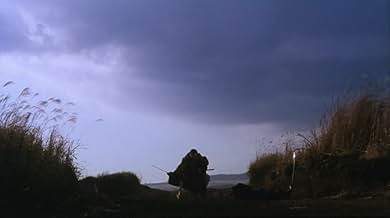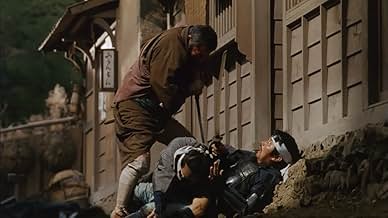CALIFICACIÓN DE IMDb
7.0/10
1.9 k
TU CALIFICACIÓN
Agrega una trama en tu idiomaBlind masseur Ichi, a defender of the innocent, gets entangled in a clash between rival Yakuza clans in a rural village, leading to bloody sword battles as he tries to maintain peace and shi... Leer todoBlind masseur Ichi, a defender of the innocent, gets entangled in a clash between rival Yakuza clans in a rural village, leading to bloody sword battles as he tries to maintain peace and shield villagers from the gang war.Blind masseur Ichi, a defender of the innocent, gets entangled in a clash between rival Yakuza clans in a rural village, leading to bloody sword battles as he tries to maintain peace and shield villagers from the gang war.
Ryûtarô Gan
- Boss Goemon
- (as Takehiro Okumura)
Argumento
¿Sabías que…?
- TriviaOn the morning of Monday 26 December 1988, in the movie village (eiga-mura) located in the mountains of Kanami, Ryûtarô Gan (age 24) - eldest son of Shintarô Katsu - stabbed Yukio Katô (age 34) in the neck with a katana long sword, while performing in an action scene for this film. Katô was taken unconscious to the Okayama University Hospital (Okayama Daigaku Igakubu Fuzoku-byôin), where he died as a result of massive blood loss from the neck wound. Hiroshima Prefectural Police determined that the incident was one of professional negligence causing death (gyômujô-kashitsu chishi).
- Versiones alternativasAlso known as, Zatoichi: Darkness is His Ally
- ConexionesFollows Zatôichi monogatari (1962)
- Bandas sonorasTsugaru Jongara Bushi
Sung by Kazuko Matsumura
Opinión destacada
All hail the genius of Shintaro Katsu for creating such a non-stop movie hero. He will always be Zatoichi in my heart, so it is heartening to know that he finished off his legacy as Zatoichi with a 26th film made thirteen years after he "retired" the character in crippling defeat in 1973. He also co-wrote and directed - his only triple threat in the history of the series. But while the movie is certainly fun, and at times very sweet, it has some flaws that don't quite allow it to live up to the excited originality of its predecessors.
The character of Zatoichi is older and wiser, but generally remains as we remember him. The fighting scenes certainly have zing and gore, with buckets of blood pouring whenever someone gets so much as a paper cut (including one particularly horrific blood-soaked scene of a villain continually slicing a subordinate in a drunken fit). And even though it was filmed in the late 80s, Zatoichi #26 doesn't lose any of the series' period-piece charm (in fact, the cinematography and is quite good).
Shintaro Katsu is at his most doddering and charming as the now-elderly Zatoichi. He is downright tender and sweet when he entertains a group of children, meets a traveling band of fellow blind masseurs, humbly succumbs to prison torture, uncomfortably accepts gifts from an old friend, or tries to understand the color red. He's fiendishly clever showing up a bunch of gamblers who are more than willing to try and cheat a blind man at dice. And he is even kinda sexy as he enjoys a seductive hot bath with a naked young yakuza powerhouse (Rowr!). It's nice that the film is attentive to the character and he certainly seems more reflective, but the story only truly comes to life when Zatoichi gets down to slicing up some arms, noses, and torsos. Those scenes are unfortunately infrequent, and while the gore is certainly excessive in the most wonderful way, the choreography is sloppy and somewhat uninspired. Katsu was approaching 60 at the time of filming, hardly a young pup, so he can't be faulted too much for toning down the acrobatics - or squatting, as the case may be.
The biggest flaw, one that doesn't make the film unwatchable but less likely to enjoy repeated viewings, is that it is overlong by half and bogged down in a plot that...well, just doesn't make any darn sense. Instead of a single foe for Zatoichi to focus on, the film features an abundance of ill-defined villains, a weepy samurai, the previously mentioned sexy yakuza leader, a shifty rival gang-leader, an imprisoned rebel, a young mother with a huge brood of kids, and Katsu's own son in the closest to main villain role as a gambling big-wig. They over-fill the story with sub-plots of battling each other for supremacy, expanding gambling empires, trading antique firearems, and ordering the gradual slaughter of each supporting character - most of whom die at each other's hands rather than by the sword-cane of our blind anti-hero. There's so much extraneous plot that there are long stretches where Ichi himself is pointless, and indeed, it feels like another film were made around him.
As a lesser sin, there is a lot to be said against the film's use of a cheesy 80s pop ballad - in English, no less. But it certainly adds the right touch of hilarious cheesiness right after a particularly gory Zatoichi bloodbath (sample lyric: "Looking at life through the eyes of a looooner"). Fortunately, it only pops up in one scene, and the rest of the music is appropriately old school.
I'd say this entry into the series is one you should see... oh, maybe fifth. Start with the first film, The Tale of Zatoichi, which is low on actual fighting, fitting more in the tone and style of Kurosawa's style of traditional samurai film. Then go to one of the middle period films - take your pick from the 17 titles currently reissued on DVD by Home Vision Entertainment, they are all fun and ridiculous in their own way (I recommend The Fugitive, but just because I had the chance to see it on the big screen). Then don't miss 1970's Zatoichi Meets Yojimo, a must see thanks to the presence of Toshiro Mifue, and probably the funniest in the series. And finally, jump to Takeshi Kitano's 2003 Zatoichi remake. Kitano's tribute is better than this 1989 entry, and covers many of the same themes.
Plus, much better music.
THEN watch this one. And after that, you've only got 22 more to go as well as the television series and the ridiculous U.S. remake Blind Fury with Rutger Hauer (an abomination if considered as part of the Zatoichi series, but a hilariously bad stand-alone film) before you have completed the Zatoichi cannon.
The character of Zatoichi is older and wiser, but generally remains as we remember him. The fighting scenes certainly have zing and gore, with buckets of blood pouring whenever someone gets so much as a paper cut (including one particularly horrific blood-soaked scene of a villain continually slicing a subordinate in a drunken fit). And even though it was filmed in the late 80s, Zatoichi #26 doesn't lose any of the series' period-piece charm (in fact, the cinematography and is quite good).
Shintaro Katsu is at his most doddering and charming as the now-elderly Zatoichi. He is downright tender and sweet when he entertains a group of children, meets a traveling band of fellow blind masseurs, humbly succumbs to prison torture, uncomfortably accepts gifts from an old friend, or tries to understand the color red. He's fiendishly clever showing up a bunch of gamblers who are more than willing to try and cheat a blind man at dice. And he is even kinda sexy as he enjoys a seductive hot bath with a naked young yakuza powerhouse (Rowr!). It's nice that the film is attentive to the character and he certainly seems more reflective, but the story only truly comes to life when Zatoichi gets down to slicing up some arms, noses, and torsos. Those scenes are unfortunately infrequent, and while the gore is certainly excessive in the most wonderful way, the choreography is sloppy and somewhat uninspired. Katsu was approaching 60 at the time of filming, hardly a young pup, so he can't be faulted too much for toning down the acrobatics - or squatting, as the case may be.
The biggest flaw, one that doesn't make the film unwatchable but less likely to enjoy repeated viewings, is that it is overlong by half and bogged down in a plot that...well, just doesn't make any darn sense. Instead of a single foe for Zatoichi to focus on, the film features an abundance of ill-defined villains, a weepy samurai, the previously mentioned sexy yakuza leader, a shifty rival gang-leader, an imprisoned rebel, a young mother with a huge brood of kids, and Katsu's own son in the closest to main villain role as a gambling big-wig. They over-fill the story with sub-plots of battling each other for supremacy, expanding gambling empires, trading antique firearems, and ordering the gradual slaughter of each supporting character - most of whom die at each other's hands rather than by the sword-cane of our blind anti-hero. There's so much extraneous plot that there are long stretches where Ichi himself is pointless, and indeed, it feels like another film were made around him.
As a lesser sin, there is a lot to be said against the film's use of a cheesy 80s pop ballad - in English, no less. But it certainly adds the right touch of hilarious cheesiness right after a particularly gory Zatoichi bloodbath (sample lyric: "Looking at life through the eyes of a looooner"). Fortunately, it only pops up in one scene, and the rest of the music is appropriately old school.
I'd say this entry into the series is one you should see... oh, maybe fifth. Start with the first film, The Tale of Zatoichi, which is low on actual fighting, fitting more in the tone and style of Kurosawa's style of traditional samurai film. Then go to one of the middle period films - take your pick from the 17 titles currently reissued on DVD by Home Vision Entertainment, they are all fun and ridiculous in their own way (I recommend The Fugitive, but just because I had the chance to see it on the big screen). Then don't miss 1970's Zatoichi Meets Yojimo, a must see thanks to the presence of Toshiro Mifue, and probably the funniest in the series. And finally, jump to Takeshi Kitano's 2003 Zatoichi remake. Kitano's tribute is better than this 1989 entry, and covers many of the same themes.
Plus, much better music.
THEN watch this one. And after that, you've only got 22 more to go as well as the television series and the ridiculous U.S. remake Blind Fury with Rutger Hauer (an abomination if considered as part of the Zatoichi series, but a hilariously bad stand-alone film) before you have completed the Zatoichi cannon.
- coolcorn
- 3 dic 2004
- Enlace permanente
Selecciones populares
Inicia sesión para calificar y agrega a la lista de videos para obtener recomendaciones personalizadas
- How long is Zatoichi?Con tecnología de Alexa
Detalles
- Tiempo de ejecución1 hora 56 minutos
- Mezcla de sonido
- Relación de aspecto
- 1.85 : 1
Contribuir a esta página
Sugiere una edición o agrega el contenido que falta

Principales brechas de datos
By what name was Zatôichi (1989) officially released in Canada in English?
Responda



























